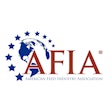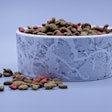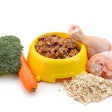Most of my public presentations over the last several years have been directed toward the petfood industry. Thus, it was with some excitement but also a little trepidation that I was given the opportunity to speak before a veterinary audience. It wasn't a single one-hour talk, but rather seven (six to veterinarians and one to veterinary technicians). In addition, I led a "meet the expert" lunch discussion with a smaller group of vets where the issues could be discussed in a more informal setting.
I talked about petfood labeling, the roles of the Food and Drug Administration (FDA) and the Association of American Feed Control Officials (AAFCO) in regulation, ingredient controversies, unconventional diets, dietary supplements, natural and organic petfoods and petfood safety. The audience seemed very interested in the topics and asked a lot of questions. I hope my information was helpful to the attendees, but it was their questions and comments during and between presentations that gave me insight as to their prevailing views.
Vets' views of petfoods
I can't speak for the attitudes of everyone in the audience, but from the nature of the questions and comments I received, I think in general, vets view petfoods relatively favorably. I didn't perceive hostility regarding the events of last year or animosity toward the industry in general. Rather, despite some of the bad press being circulated (especially since the recalls last year), there's an understanding that the issues are complex and for the most part, they are willing to give the industry the benefit of the doubt.
Veterinarians, I believe, are typically practical people, in that they can distinguish issues that should be of concern and those that are less important. For example, my impression was that while there was concern over matters such as safe handling of raw foods, most understood that properly processed by-products can be perfectly acceptable ingredients and safe for animals, even though they may not be normally consumed by humans. Then again, in my experience vets may have a lower threshold than the average consumer when it comes to food aesthetics.
Vets want calorie information
That is not to say veterinarians do not have criticisms of petfoods, however. A number of vets were skeptical regarding designations for use beyond basic life stages, especially with regard to breed-specific foods.
Without any prompting on my part, a veterinarian asked, "When are they going to require calorie information?" He thought that would be very useful information and didn't understand why it wasn't on the label. His question allowed me a chance to discuss the American College of Veterinary Nutrition's proposal to AAFCO, its current status and hopeful outcome.Those present voicing opinions were very much in favor of the idea of mandatory calorie content statements.
Other issues that drew some concern include the "product family" method of nutritional adequacy substantiation. I think since vet students have long been taught that AAFCO feeding trials are superior in ensuring the nutritive value of a food compared to AAFCO profiles, they were dismayed to find that many products bearing the "Animal feeding tests" label statement may not have undergone the full feed testing procedure.
Many were also unpleasantly surprised that data to support the efficacy of "therapeutic diets" (i.e., foods distributed directly by vets to clients for mitigation of certain disease processes) were not routinely reviewed by a regulatory agency.
Vets want straight talk
Clients often bring their veterinarians information from the Internet or elsewhere that either falsely disparages a product or ingredient (if not the industry as a whole) or promotes outlandish claims of benefit for another diet or ingredient. Thus, vets would appreciate sound facts to help them respond to this barrage of misinformation. For example, I received several questions about how they should best address their clients' concerns regarding the source of ingredients in petfoods and other safety matters. On the other hand, materials that try to paint a totally noncritical picture of petfoods would be perceived as biased as well and would likely be viewed with due skepticism.
Vets want assurances
Regarding veterinarians' understanding of how petfoods are regulated, most know that FDA has a role, but they know less about AAFCO and state agency involvement. Hopefully, I was able to clear up any misperceptions (e.g., that AAFCO is not a trade association). However, I'm not sure how much detail they want to know.
For example, I'm unsure they really care about the legal distinction between "foods" and "drugs" as much as they want assurances that any label statement (whether a "drug claim," or not) is truthful and not misleading. Similarly, it may be less important that a nutraceutical product may be regulated as an animal feed or an "unapproved drug of low regulatory priority" than to know whether the government is actively reviewing products to ensure safety regardless of regulatory status.
To my surprise, the least attended presentation was my talk on petfood safety. Maybe there was a very popular speaker on the program in another room, I don't know, but it also was the one that prompted the fewest audience questions. I would have thought the recalls last year would have sparked more interest, but with all the emphasis at veterinary meetings since then, perhaps they are weary of the topic for now.















